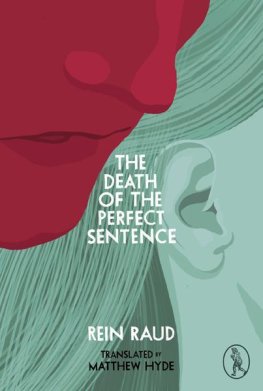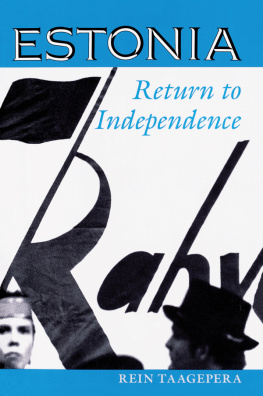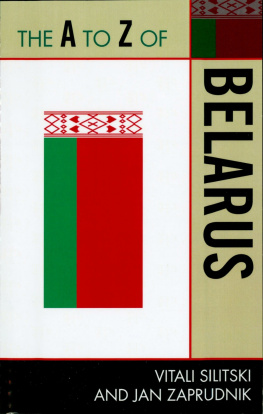Rein Raud
THE DEATH OF THE PERFECT SENTENCE
Translated by Matthew Hyde
I am aware that the following story contains departures from the historical truth. The spot where pickets were held from spring to autumn was not in fact visible from the caf where the two men were sitting. The statue of Kalevipoeg referred to does not exist, nor did the sculptor who might have created it. And even if it had stood where I put it, I doubt that it could have been used in the way described. And so forth. Memory is unreliable. Time speeds up. Successive summers merge into one. I can only apologise.
As is written in the classics, any similarities with real events are coincidental, but all names have been left unchanged.
There are two of them, sitting on the caf terrace, at the far end by the railing, from where there is a good view of the square, and one of them is holding a pair of binoculars for that very purpose. They could be brothers judging by the similarity of their faces, which are expressionless and unremarkable. On closer inspection, its difficult to say exactly what makes them seem alike. They are both wearing exactly the same type of suit: dark, poorly fitting, evidently standard issue. Totally unsuitable for todays warm weather. And they both have the same kind of glass on the table in front of them, one-third full of mineral water.
There is no one else there. Its quiet, apart from the barely audible murmur of the street. Earlier there was a group of young punks as well, but as soon as the two men arrived, the scruffy lads and the blue-haired girls beer-addled banter turned into an agitated whisper, and they got up, paid their bill, and left. From then on the two men had the whole place to themselves.
They dont exchange a single word. They just sit there looking over the railing, towards the square. Not that it looks in any way different from yesterday, the day before yesterday, or the day before that. Worried, weary people walking past avoiding each others gazes, the occasional tourist wandering around distractedly, a Communist Party slogan hanging on the wall of the grey building, and outside it the same pickets who have already been there for several weeks, holding banners demanding Occupying forces out of Estonia! and Release Aare Murakas! You can show your support for the latter with a signature. Some people do. There is a large glass jar for you to donate your rapidly depreciating roubles in support of the struggle for freedom. Some do that too, and the jar is already half full. Friends and strangers come up and shake hands, others wave from a distance. Some of them chuckling, some wary, others looking around with frightened expressions on their faces. In case anyone spots them there.
Those two men are not in the slightest bit interested in who Aare Murakas is or what he may or may not think about things, nor do they consider the forces whose withdrawal is called for to be occupation forces. But neither are they particularly worried about the pickets. Not just because they dont take the whole independence movement very seriously. Its just a bunch of kids after all. Has a mosquito ever floored an elephant? These two men have never read the Bible, and for them David and Goliath is just a Jewish legend with no bearing on reality. Something is about to happen here nevertheless. That is why theyre sitting on this caf terrace right now.
A young man and woman walk up to the caf and have already started to sit down when they notice the two men. The young man says a couple of words, out of earshot, to the woman, then they both stand up and hurriedly leave.
The pickets faces are clearly visible through the binoculars. They are recognisable from the intelligence files, especially Ervin, a lanky young man with curly red hair and freckles, who is the reason they are there. Ervin is edgy. His companions have no idea why. They probably dont even notice that he is hopping from foot to foot, as if he needs the toilet. Perhaps he really does. But even if he doesnt, Ervin is known to be the restless type. The two men know what the problem really is: Ervin has made his choice. Its not surprising that a person who is about to do something life-changing is a little edgy. Because Ervin is the only one who knows the two men are there. He also knows that one or the other of them is watching him constantly waiting for him to give the sign. Thats why hes so edgy. And he cant even think about going to the toilet until he has done what he has to do.
By now the waitress is fed up with these two men. The mineral water in their glasses has not gone down; a normal customer would have downed two beers in the length of time theyve been there. This is a caf, after all. People come here to eat and drink. There are other places to sit and birdwatch. The waitress is fully prepared to point all this out to them. Expressionless faces and out-of-place dark suits clearly dont confer any special privileges. She approaches their table and opens her mouth to speak. Thats when she notices the bulges in their breast pockets and the bulky walkie-talkie on one of their knees. And so she says, Would you like anything else?
No thank you, one of them replies.
Indrek walked slowly past the Kiek in de Kk tower and along the tarmac road which led down one side of Harjume Park. Almost no one apart from the odd map buff and a couple of city government staff knew that its official name was Soviet Street. Indrek was in a good mood, and he had some time on his hands, even if he now only had a couple of ten-rouble notes left in the wallet in the pocket of his construction brigade jacket, and they had to last him for a while yet. As far as his parents knew he was still working with that construction brigade, building some stupid barn at a collective farm out in some stupid backwater. In the old days they used to pay you properly for that kind of work. Now you got peanuts. It may have seemed a large sum of money in spring when the wages were agreed, but by the time it reached Indreks wallet, if it actually got there, it wouldnt buy him much. And there was just so much happening across the country. In Indreks view the kind of people who were happy to build some stupid barn out in some stupid backwater while history passed them by or ran roughshod over them fully deserved their fate. That wasnt for him. Hed reached the age of majority, having turned eighteen two months ago, and now he was allowed to drive a car, get married, vote and be elected. He was ready to make his own choices. Living at his fathers house in Keila was no longer one of them. So hed been in Tallinn for three weeks now, staying here and there with different friends, his hand firmly on the pulse of history. It was beating in different places, in different ways, but he wasnt too bothered about all the friction between the political forces. That was just a surface tremor, they were all working to a common goal.
And while all that was going on Indrek was also busy trying to find himself a soulmate. When a whiff of freedom is in the air, people open up too, and start seeing endless open avenues all around them. Or at least that was what he hoped.
Indrek was a spotty-faced youngster who read a lot, and hed chipped teeth too. Sometimes he managed to meet a girl who didnt need to be told who the Strugatskys or Bradbury or Lem or Simak were, and everything would go quite well. That is until he tried to put his arms around her and bring his face close to hers. Then he would discover, much to his surprise, that their earlier bond was broken, or completely lost, even if they could carry on talking about the same things almost as before. When he later saw that same girl dancing with one of his friends, with her arms around him and her vision dimmed by a romantic mist, he felt completely crushed. Maybe his teeth were the problem. The dentist was to blame for the state they were in. During his school years, one dreaded day in the dismal depths of winter, the nurse would look round the classroom door and yell out the names of the pupils who had to see the dentist. They would come back clutching new dental records, and one by one the whole class would go. Two or three dentists set themselves up in the school nurses office, where they checked every single pupil. Their equipment was old and basic, and the resulting pain was excruciating, but the dentists were in a hurry, they had several hundred children to get through. When the dentist first checked Indrek all she could do was let out a shriek. What horrible teeth! Naturally it meant a lot of tedious work, seeing that same spotty boy again and again, until she could put a tick in the box and place Indreks dental records on the other pile. And she did all that with equipment which was even older and more worn out than she was. Of course Indrek looked forward to those appointments even less than the dentist. Once during Christmas his first two fillings fell out, leaving him facing the New Year in much the same situation as before. It didnt help matters that Indrek liked to suck sweets as he read; in fact he scoffed them and could polish off a whole bag of Goose Feet chews or Golden Key toffees without noticing. But one year things were different Indrek somehow got hold of a book about scientists from the Loodus publishers Golden Book series, published during the first Estonian Republic. There he learned that the inventor of the microscope, Antonie van Leeuwenhoek, never had a single problem with his teeth, because he rubbed them with a goose feather every day after brushing, just as his mother had taught him. Indrek couldnt lay his hands on a goose feather, but he decided that a flannel would serve the same purpose, and this proved to be right next autumn he found that for the first time he didnt have a single cavity. But having proven his hypothesis to himself, his perseverance did not last. By the time he finished middle school his parents were forced to completely replace his rotten front teeth. What happened to the rest of his teeth was going to be his own business.










